Bonding moments
Updated: 2013-06-28 07:40
By SL Luo and Kahon Chan(HK Edition)
|
|||||||||
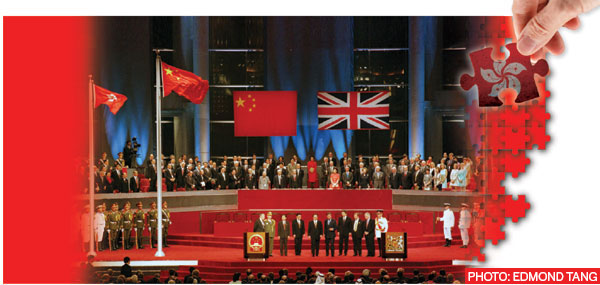
As the HKSAR strides into its 16th year, the city can confidently reflect on the enormous paces that have been made on virtually all fronts of public life since the handover.
Integration between Hong Kong and the mainland in the political, financial, educational, social, cultural, scientific and sports arenas have been vastly stepped up - a testament to the bonds of kinship that have long existed between the peoples of Hong Kong and the mainland.
Such relations have never been closer.
Hong Kong's financial and trading status, as well as the continued well-being of its people, has been uppermost in the minds of State leaders, as evidenced by the wide array of business and social incentives they have brought along with them during visits to the city.
President Xi Jinping and Premier Li Keqiang had been to the SAR long before they assumed the highest offices of the country.
And, the Closer Economic Partnership Arrangement (CEPA), which was signed exactly a decade ago, has helped propelled trade between Hong Kong and the mainland to new highs.
The central government has also never failed to share with Hong Kong people the glory and pride resulting from some of the nation's historic achievements, including those in space, education, science and sports. Some of those feats have been instrumental in forging even closer ties with Hong Kong, with Hong Kong residents fortunate enough to have been accorded the honor of participating in them.
Hong Kong people, in return, had displayed unprecedented nationalism and sympathy following the Sichuan earthquake in 2008 through donations and by playing an active role in helping to rebuild the devastated areas.
The road ahead sounds promising if such co-operation and understanding are allowed to proceed unhindered to the betterment of both sides.
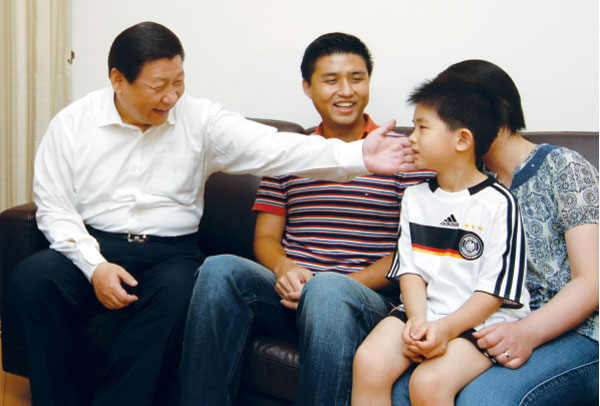
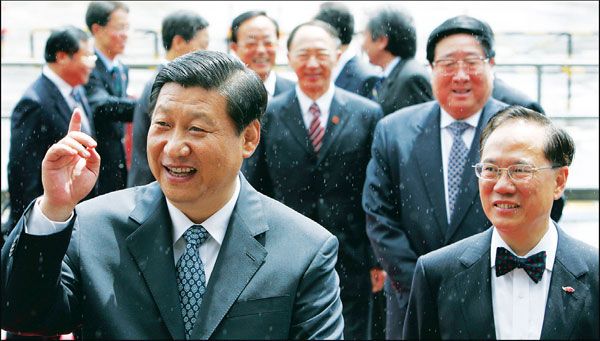
From State leaders with love
State leaders have continued to show their deep concern for Hong Kong's development and the welfare of its people since the handover. President Xi Jinping made his last trip to the HKSAR in July 2008 when he was still Vice-President, visiting 19 locations and attending various functions during a three-day tour. He inspected venues where the equestrian events were being held during the 2008 Beijing Olympic Games and met local athletes, offering them words of encouragement. Xi also called on two families and made a presentation on Hong Kong's infrastructure development at the headquarters of the Hong Kong Monetary Authority. The then Vice-President also praised the Hong Kong rescue team for the relief efforts they extended following the massive Sichuan earthquake that year. Other State leaders, such as Hu Jintao, Li Keqiang and Wen Jiabao, also came to Hong Kong on various occasions, carrying with them baskets of financial sweeteners in support of the city's development.
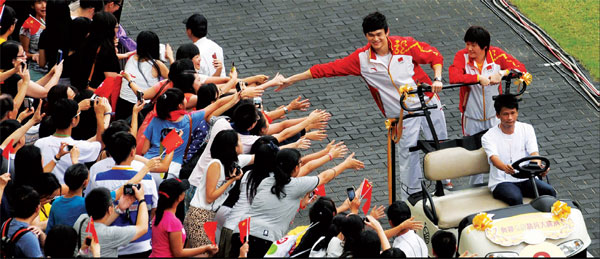
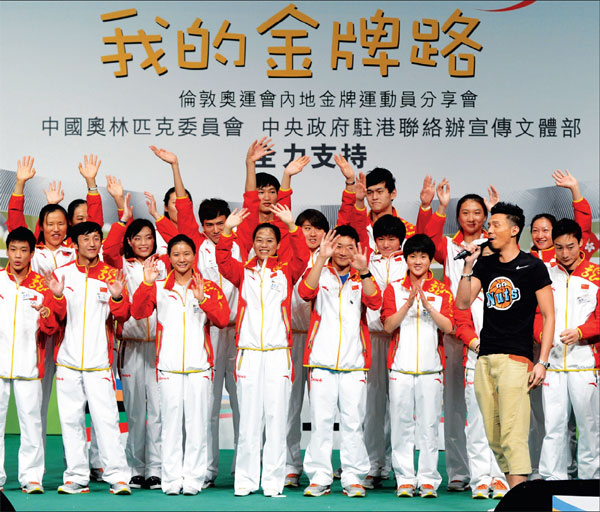
Olympic medalists share pride
Star-studded delegations of gold medalists of the national Olympic team, who had taken part in the 2004, 2008 and 2012 Games, made separate visits to Hong Kong to share their joy and glory with the people. The visit of a team of 68 gold medal winners in the 2004 Olympic Games in Athens was timely and had served to prop up Hong Kong's moral in the wake of the 2003 SARS pandemic. National sports stars, including Guo Jingjing and Liu Xiang, stole the show, delighting crowds with their sports achievements. Similar visits were made by mainland gold medalists in the 2008 Beijing Games and the London Olympics last year. Besides giving demonstrations of their sporting prowess, the athletes also partcipated in open-air variety performances.
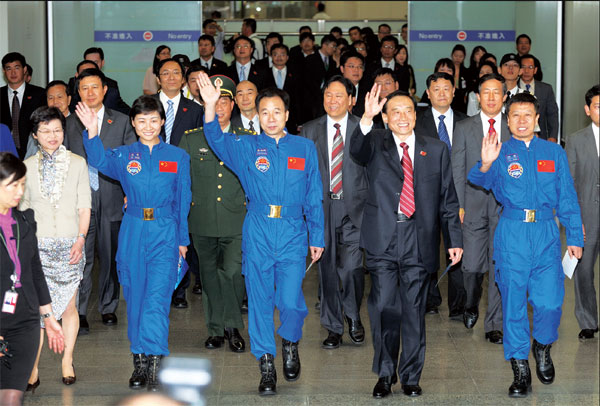
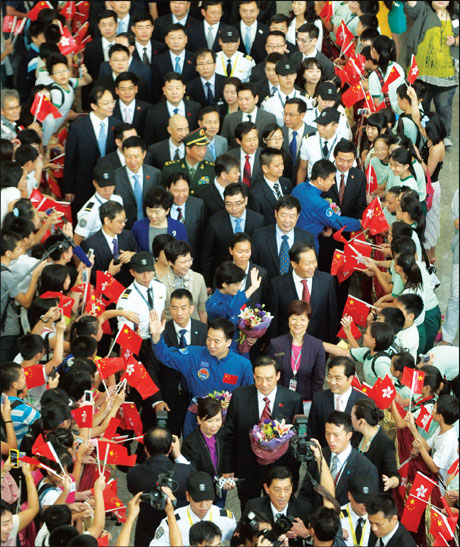
Hong Kong, here we come!
Yang Liwei - the mainland's first astronaut - was cheered by a crowd of 40,000 people at a gathering held in his honor at Hong Kong Stadium on November 1, 2003. "Hong Kong compatriots make me feel at home," Yang told the crowd. The astronaut was in the city for two weeks following the successful launch of Shenzhou 5 - the country's first manned space mission. More than 70 percent of young Hong Kongers said in a survey the success of the space mission had made them feel proud to be Chinese. Thousands of students, waving national and HKSAR flags, greeted Yang and his team on their arrival in Hong Kong. Yang also attended official galas and went sightseeing. He spent his last day in the city sharing his experiences with educators and students.
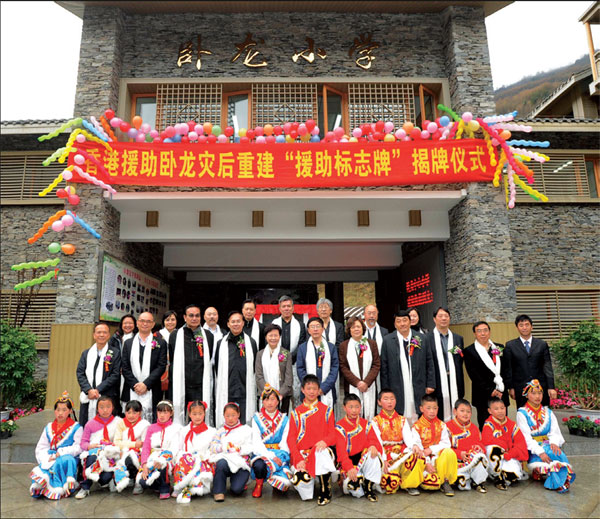
Sichuan quake victims not forgotten
Hong Kong rallied to the aid of the victims of the devastating earthquake in Sichuan Province in 2008, providing huge financial and technical support for the reconstruction of the stricken areas. The Hong Kong government signed an agreement with the Sichuan provincial government in October 2008 to fund 190 projects to rebuild welfare facilities, schools, hospitals and roads. A "Trust Fund in Support of Reconstruction in the Sichuan Earthquake Stricken Areas" was set up in July 2008 with a HK$6-billion infusion of cash. As of March this year, 175 out of 190 projects are already in operation.
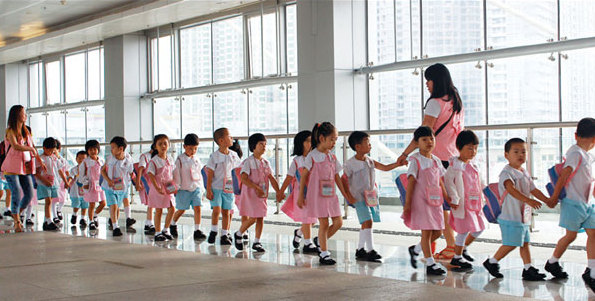
One in the same family
There has been a marked increase in the number of children of Hong Kong residents crossing the border from Shenzhen every day to attend school in Hong Kong, testifying to the extent of the growing economic, cultural, educational and social bonds between the HKSAR and the mainland since the handover. The children are either from Hong Kong family members who have moved to Shenzhen to work or to seek lower living costs, or from families with Hong Kong and mainland parents. Hong Kong's top court, the Court of Final Appeal, ruled in 2001 that all Chinese children born in the city qualify for permanent residency. Dedicated lanes for school children have been set up at border checkpoints to facilitate the rapid rise in the number of children crossing over to Hong Kong to attend primary schools in the North District. The government has said it's difficult to foresee how many mainland parents will send their Hong Kong-born children to local schools.
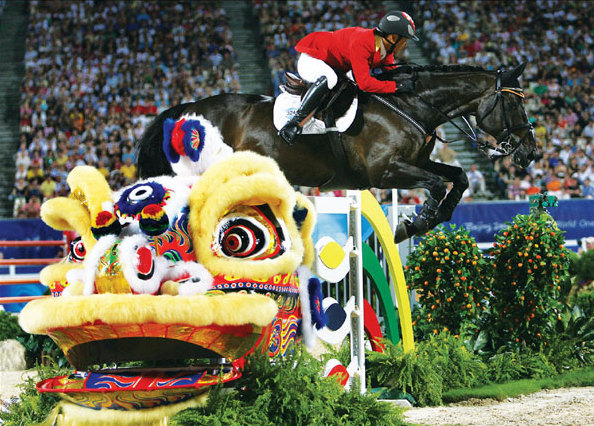
An Olympics first for HKSAR
Hong Kong was accorded the honor of hosting the equestrian events for the 2008 Beijing Olympic Games. It was the first time the city has ever staged an Olympics event and had only less than three years to prepare for the occasion. The makeshift venue housing the training courses was converted from the Hong Kong Sports Institute (HKSI) complex, adjacent to the Sha Tin racecourse. Other facilities built for the event included a dozen training courses of various sizes and more than 200 stables. The Hong Kong Jockey Club provided the expertise and equipment, sparing the organizers the hassle of having to meet the strict requirements. The HKSI was restored and rebuilt. While part of the new complex opened in June this year, all the facilities are scheduled to be completed by late 2014.
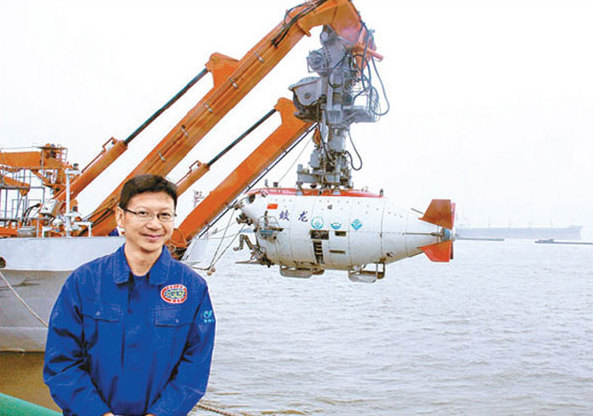
HK scientist takes Jiaolong dive
Qiu Jianwen, an assistant professor of ocean biodiversity and fishing resources protection at Hong Kong Baptist University, became the first local scientist to take part in expeditions conducted by the nation's manned deep-sea submersible, Jiaolong. A total of 14 scientists took part in the Jiaolong's scientific research on undersea life and geological structures during a 113-day mission in June 2013 in the South China Sea. Qiu had earlier undergone two weeks' training to qualify as a Jiaolong crew member and will spend 40 days in the vessel's laboratory studying biological samples. He earned his PhD in Hong Kong and has been involved in research supported by the Environmental Conservation Fund in Hong Kong.
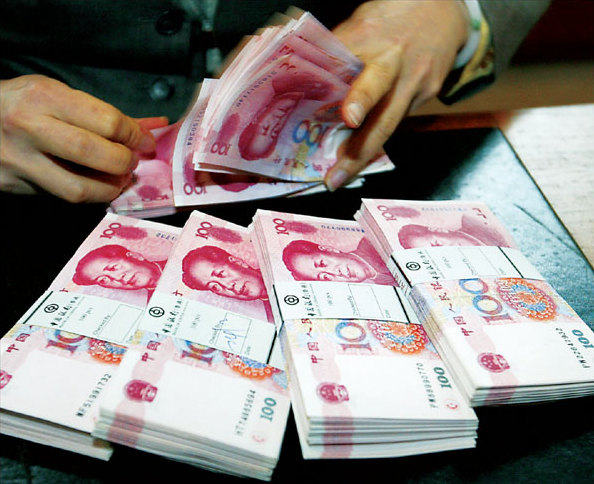
Reversing the tide: Yuan is king
Amid the mainland's rapid economic growth, the yuan has emerged as a major international currency. In a stark reversal of fortunes, mainland visitors, particulary from Shenzhen, have been swarming Hong Kong since the handover for sightseeing and shopping, taking full advantage of a stronger yuan. Hong Kong people, on their part, have been strengthening their yuan reserves locally as a hedge against inflation. The central government's policy to turn the HKSAR into an offshore RMB center has further stimulated demand for the currency and created a new sector in the financial industry.
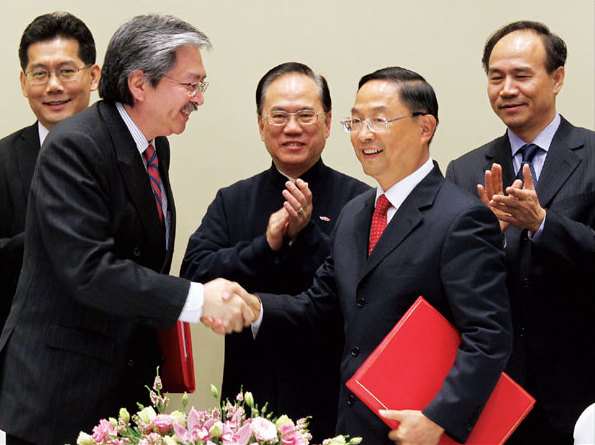
CEPA says it all
The volume of Hong Kong goods exported to the mainland has reached new heights, thanks to the Closer Economic Partnership Arrangement (CEPA), which was signed exactly a year ago. In the first five months of this year, the total value of exports to the mainland hit HK$768.06 billion, accounting for 55 percent of the city's total exports. By comparison, the total value of Hong Kong's exports to the United States stood at HK$123.98 billion during the same period. Meanwhile, the mainland has removed barriers to its huge market, providing Hong Kong businesses with vast investment opportunities in financial, legal and healthcare services.

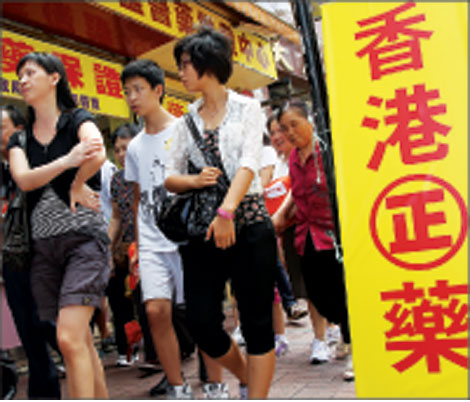
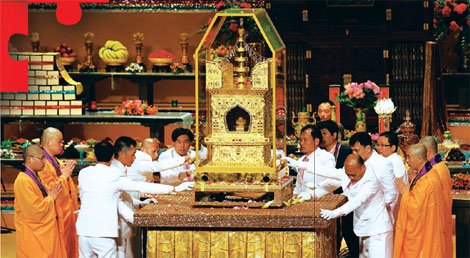
Buddha relic enshrined in HK
More than one million Buddhist followers in Hong Kong were given a rare honor in 2012 when the only existing Sakyamuni Buddha parietal-bone relic was taken outside of the mainland for the first time to be exhibited in the HKSAR. The relic was excavated at the Nanjing Grand Bao'en Temple in 2008. Hundreds of thousands of people turned up to pay their respects to the relic at a six-day exhibition at the Hong Kong Coliseum from April 25 to 28. A Grand Blessing Ceremony, believed to be the largest Buddhist ritual ever held in the city, took place on April 28. In conjunction with the exhibition, the Third World Buddhist Forum was held in Hong Kong from April 26 to 27.
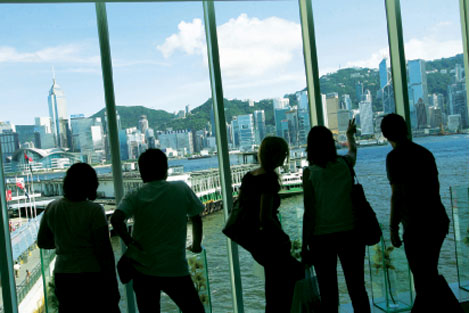
IVS triggers HK tourism boom
It has been almost exactly 10 years since the Individual Visit Scheme (IVS) was first introduced on July 28, 2003, covering four cities in Guangdong Province. Prior to that date, mainland visitors had to travel in groups to Hong Kong. At present, residents of 49 mainland cities qualify for the scheme, while Shenzhen residents are also eligible for multiple-entry visas to the HKSAR. The scheme has sparked an unprecedented tourism boom for the city, boosting, in particular, the coffers of the retail and hospitality industries. In April this year alone, Hong Kong hosted 3.1 million mainland visitors, registering a year-on-year increase of 17.5 percent. But, the question remains: Does Hong Kong have the capability and adequate facilities to cope with the huge influx of visitors?
(HK Edition 06/28/2013 page4)